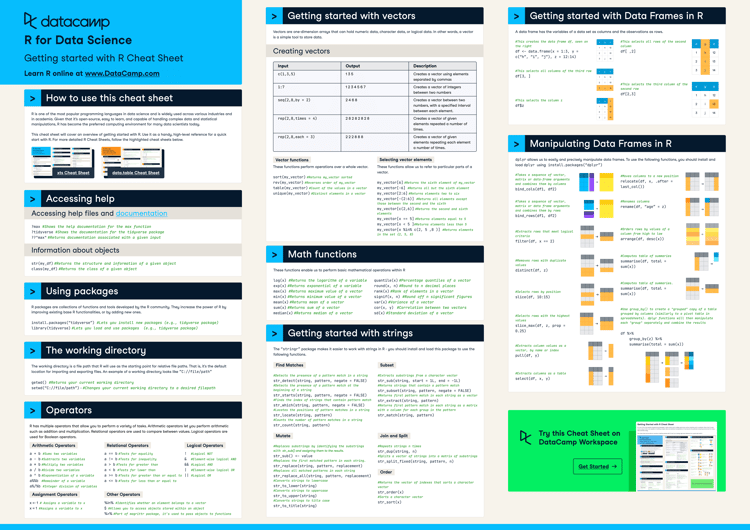Course
R courses
R is a powerful programming language widely used for data analysis, statistics, and machine learning. DataCamp’s R courses provide interactive, expert-led training to help you master data manipulation, visualization, and modeling. With hands-on exercises and real-world projects, you’ll build practical skills from day one. Start learning R today and unlock new opportunities in data science.
Create Your Free Account
or
By continuing, you accept our Terms of Use, our Privacy Policy and that your data is stored in the USA.Training 2 or more people?
Try DataCamp for BusinessRecomended For Starters
Become an R programmer and develop your R skills with interactive courses, tracks and projects, curated by real-world experts.
BasicSkill Level
4 hours
34.7K
Track
R Programming Fundamentals
22 hours
12.6K
Not sure where to start?
Take an AssessmentBrowse R courses and tracks
Course
Introduction to R
BasicSkill Level
4 hours
34.7K
Course
Introduction to the Tidyverse
BasicSkill Level
4 hours
7.1K
Course
Intermediate R
BasicSkill Level
6 hours
7K
Course
Introduction to Data Visualization with ggplot2
BasicSkill Level
4 hours
5.3K
Course
Introduction to Statistics in R
IntermediateSkill Level
4 hours
4.8K
Course
Data Manipulation with dplyr
BasicSkill Level
4 hours
3.9K
Course
Introduction to Regression in R
IntermediateSkill Level
4 hours
3.3K
Course
Exploratory Data Analysis in R
IntermediateSkill Level
4 hours
2K
Course
Introduction to Importing Data in R
BasicSkill Level
3 hours
1.7K
Course
Joining Data with dplyr
BasicSkill Level
4 hours
1.7K
Course
Intermediate Data Visualization with ggplot2
IntermediateSkill Level
4 hours
1.7K
Course
Hypothesis Testing in R
IntermediateSkill Level
4 hours
1.6K
Course
Introduction to Writing Functions in R
BasicSkill Level
4 hours
1.4K
Course
Supervised Learning in R: Classification
IntermediateSkill Level
4 hours
1.3K
Course
Writing Efficient R Code
IntermediateSkill Level
4 hours
1.3K
Course
Intermediate Regression in R
IntermediateSkill Level
4 hours
1.2K
Course
Cleaning Data in R
IntermediateSkill Level
4 hours
1.2K
Course
Sampling in R
IntermediateSkill Level
4 hours
1K
Course
Supervised Learning in R: Regression
IntermediateSkill Level
4 hours
976
Course
Introduction to R for Finance
BasicSkill Level
4 hours
975
Course
Reshaping Data with tidyr
IntermediateSkill Level
4 hours
901
Course
Linear Algebra for Data Science in R
IntermediateSkill Level
4 hours
792
Course
Communicating with Data in the Tidyverse
BasicSkill Level
4 hours
787
Course
Unsupervised Learning in R
IntermediateSkill Level
4 hours
657
Course
Introduction to Bioconductor in R
IntermediateSkill Level
4 hours
646
Course
Reporting with R Markdown
IntermediateSkill Level
4 hours
639
Course
Time Series Analysis in R
IntermediateSkill Level
4 hours
597
Course
Hierarchical and Mixed Effects Models in R
AdvancedSkill Level
4 hours
573
Course
Foundations of Probability in R
BasicSkill Level
4 hours
551
Course
Object-Oriented Programming with S3 and R6 in R
AdvancedSkill Level
4 hours
546
Related resources on R
blog
The Top 8 R Project Ideas for 2026
Discover what R is and all the benefits for using it while giving examples and new ideas for a project.
Elena Kosourova
14 min
blog
Python vs R for Data Science: Which Should You Learn?
This guide will help you answer one of the most frequently asked questions of newcomers in data science and help you choose between R and Python.
Javier Canales Luna
10 min
cheat sheet
Getting Started with R Cheat Sheet
This cheat sheet will cover an overview of getting started with R. Use it as a handy, high-level reference for a quick start with R. For more detailed R Cheat Sheets, follow the highlighted cheat sheets below.
Richie Cotton
9 min

